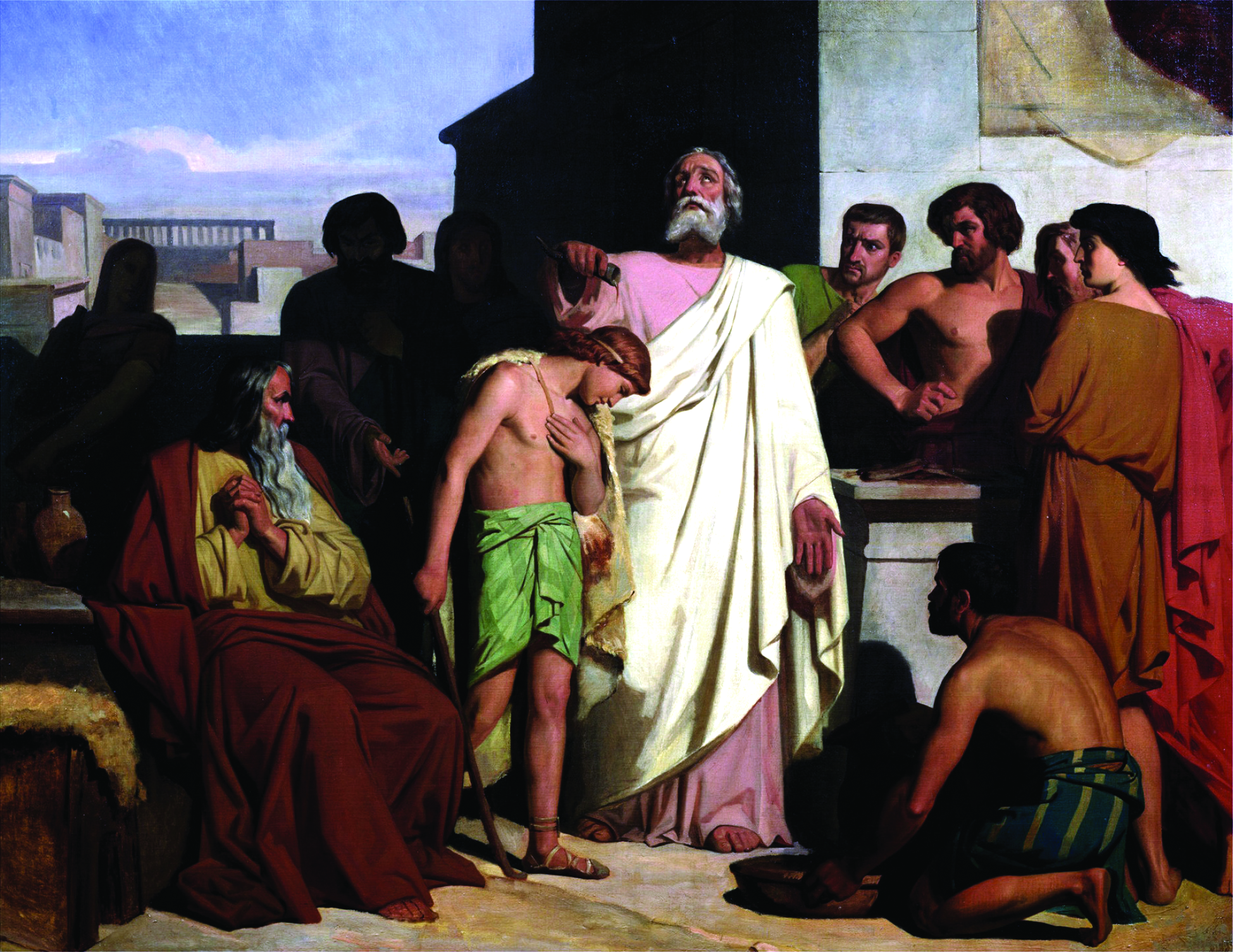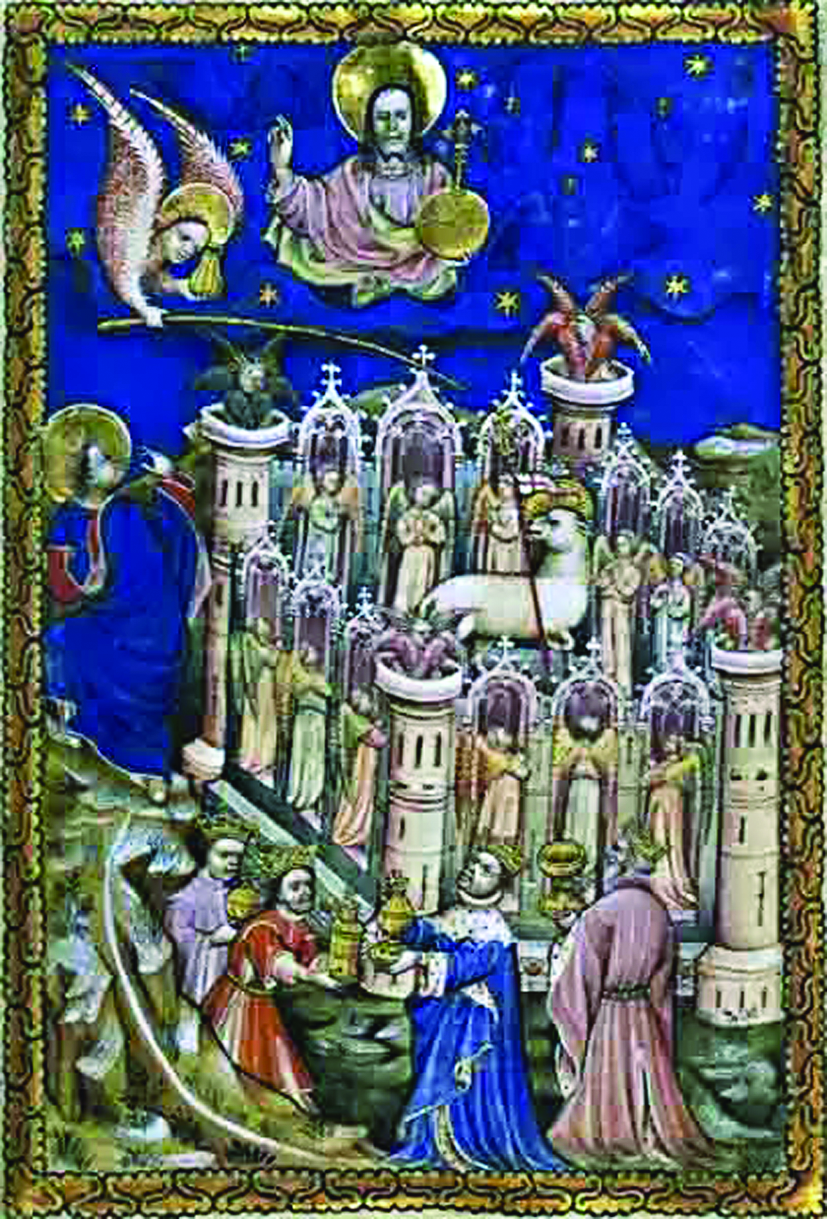Give Be Back Again the Joy of My Youth
The Lord cheers the middle of my youth, not just in age, just in spirit

The Anointing of David by Samuel, by Félix Joseph Barrias, Musée de la Ville de Paris
"So I shall go in unto the chantry of God, of God, who gives joy to my youth" (Ps. 42:four).
By Prof. Anthony Esolen
The beginning time I read those words afterward a hiatus of forty years, I believe my heart skipped a trounce, equally they are so beautiful then fitting where and when and by whom they were commonly spoken.
But I must explicate. I had of class read the psalms all my life long. Just the verse above does not appear in the version of the psalms which Pius XII approved for liturgical utilise within the Mass. It is a translation of Saint Jerome's Latin: Introibo advertizing altare Dei, ad Deum qui laetificat iuventutem meam. And for that verse, Jerome follows closely the Greek Septuagint, that famous translation of the Onetime Attestation past Greekspeaking Jews in Alexandria.
It is a part of the psalm that the priest and the altar boy would recite antiphonally at the very beginning of Mass, in the old rite. Think of the power of it, then. The priest said, in Latin, "I will go in to the altar of God," and the altar boy responded, "To God, the joy of my youth."
That is what they said before they began the psalm, and what they said later on the psalm, just before they prayed the Confiteor, commencement the priest in his person, and and then the altar male child in his. Within the psalm itself, the altar boy speaks the whole verse. It thus acquires a profoundly embodied and personal force. The priest was one time young, besides, and he hears from the server a voice of youth, the voice of a lad who may by the grace of God anytime become a priest in his plough and lead the prayer for some other youth, saying, Introibo ad altare Dei.
The Greek is glorious in its own right. The psalmist says that he will enter unto the thysiasterion of God — the altar, simply literally, the place firmly fixed where cede is made, specifically where the smoke goes upward, and we may think of the censer and the intensity of the effluvious spices, gently burning. God gives good cheer to my phren, the eye, the breast as the seat of passion and will, the identify of understanding and loving what is skilful. He cheers the heart of my neotes, my youth, not just youth in age but in spirit — my youthfulness — and thus can even an old human being like me pray the prayer in earnest.
The give-and-take is appreciating in forcefulness. In this regard information technology resembles the Hebrew na'ar, youth, sometimes servant, but oftentimes lad: used of the boy Isaac every bit he climbs the mountain with his begetter Abraham, of the young Benjamin whom his elder brother Joseph longs to see, and of David, when the prophet Samuel anoints him to be king of State of israel.
Here is the psalm-prayer in its entirety, as divided between the priest and the server. I requite the translation from the erstwhile Saint Joseph Missal:
P. I volition go in to the altar of God.
S. To God, the joy of my youth.
P. Requite judgment for me, O God, and determine my cause against an unholy people: from unjust and deceitful men evangelize me.
Due south. For K, O God, art my strength; why hast One thousand forsaken me? And why do I go about in sadness, while the enemy afflicts me?
P. Transport forth Thy light and Thy truth; for they have led me and brought me to Thy holy colina and Thy domicile place.
S. And I will go in unto the altar of God, to God, the joy of my youth.
P. I shall withal praise Thee upon the harp, O God, my God. Why art thou sad, my soul, and why dost g trouble me?
S. Trust in God, for I shall still praise Him, the salvation of my eyebrow, and my God.
P. Glory be to the Begetter, and to the Son, and to the Holy Spirit.
S. Every bit it was in the showtime, is now, and ever shall be, world without end. Amen.
P. I will go in to the altar of God.
Southward. To God, the joy of my youth.

The Celestial Jerusalem and the Lamb, miniature in the Biblioteca Nazionale of Paris, France
When I get to Mass, I try to say those opening prayers silently, while people are filing in, and (if I am in an unfamiliar church building) while the officials of the proceedings go ready to event a welcome and announce their names to all and some. The psalm helps me to remember why I am in that location. The psalmist longs to go to the temple, the firm of God in Jerusalem. I accept a higher ambition. I long to go to the new Jerusalem, where the saints and angels make an eternal sacrifice of praise to God, to God who has fabricated all things new, who gives joy to their youth. What happens on earth is a participation in what happens in that twelvegated city above. I can say, with all the greater confidence, "I shall go in unto the altar of God," considering Jesus, the Lamb of God, has sacrificed himself on the altar of the cross for my sins, and thus prepared a identify for united states there.
One more signal – a crucial one, I think. Oftentimes when you go to Mass, you lot are non feeling joyful at all. There is trouble at piece of work. Your child has disappointed you. You have done wrong, and you know it. Nor exercise you experience like pretending that all is well. That kind of pretense is exhausting, and afterward y'all take tried to keep a frozen smiling on your face, the disillusionment comes, and you say, "Maybe I do non belong here after all." For joy cannot exist forced. You lot can be wangled into a practiced mood, but non into joy, that serenity, soaring fullness of life.
Hence it is fitting that the opening psalm for Mass should embrace the trouble, the doubts, the cry of the anguished heart, "Why take you forsaken me?" Simply the psalmist too recalls the light of God, the light that has now and in the past led him to the holy mountain. He begs that God may polish forth that low-cal in one case more, and then he ends with praise, tenderly rebuking his ain centre for its sadness, and affirming his trust in the God of his salvation.
And what a bold pick it is, to subclass the prayer with that beautiful verse. We brainstorm and we end with the affidavit. Call up of the words of Jesus: "In the world you shall accept trouble, simply fear non, for I have overcome the globe" (Jn. 16:33).
Share
Championship
Source: https://insidethevatican.com/magazine/to-god-the-joy-of-my-youth/

0 Response to "Give Be Back Again the Joy of My Youth"
Post a Comment